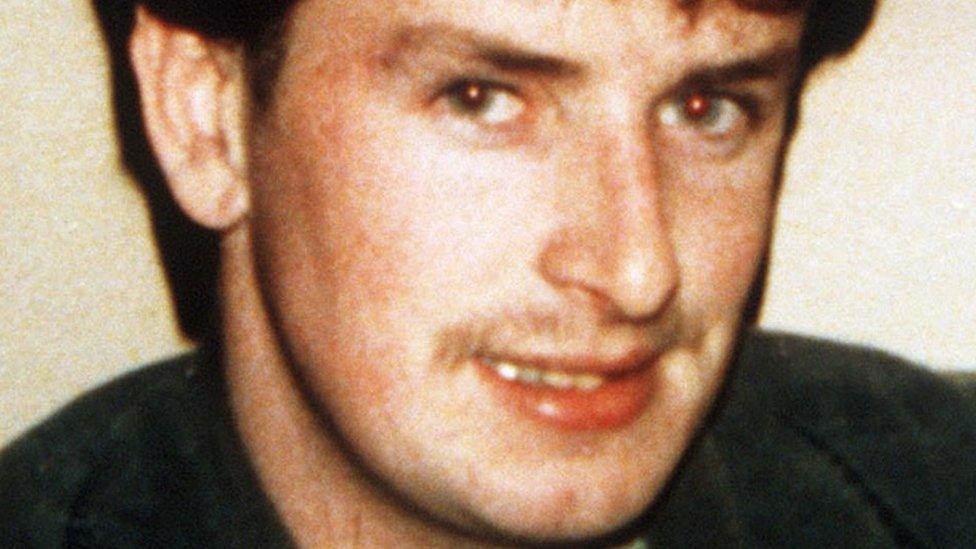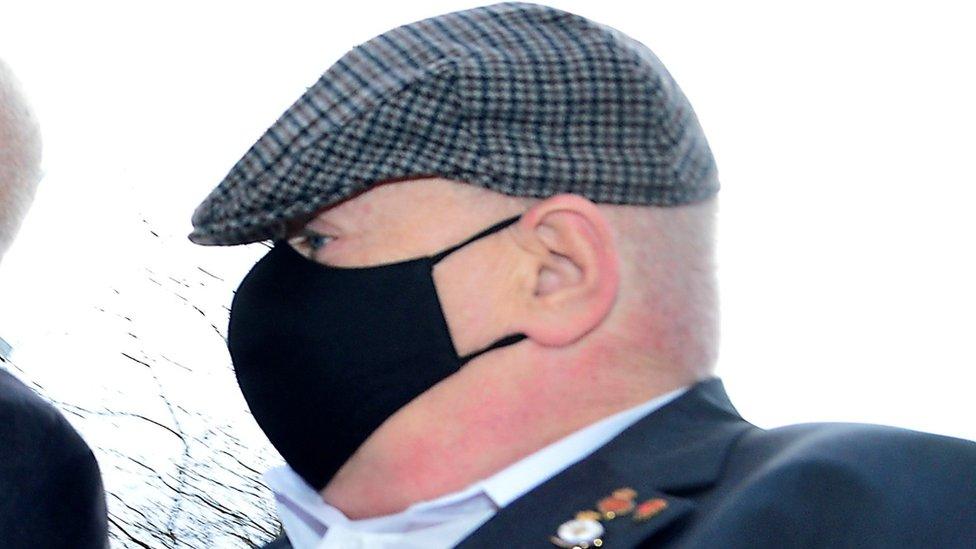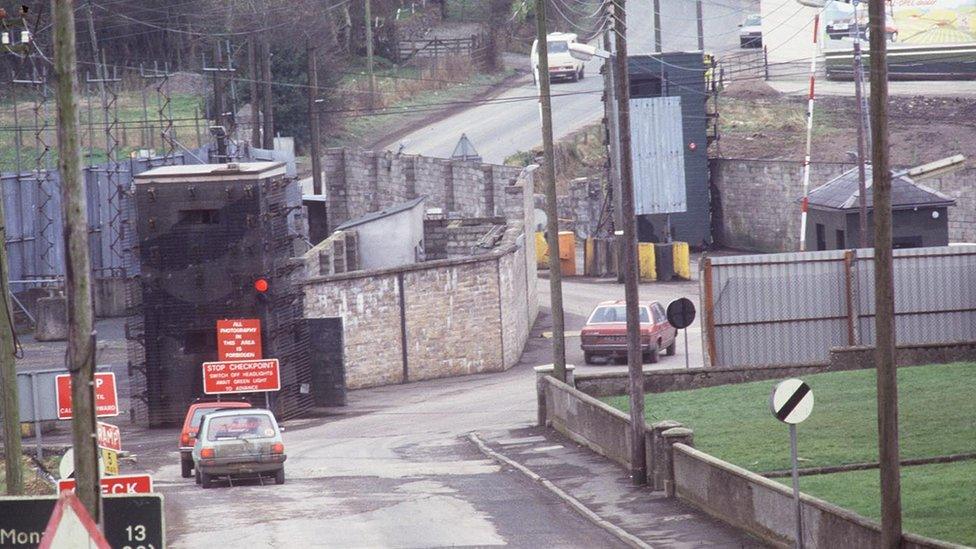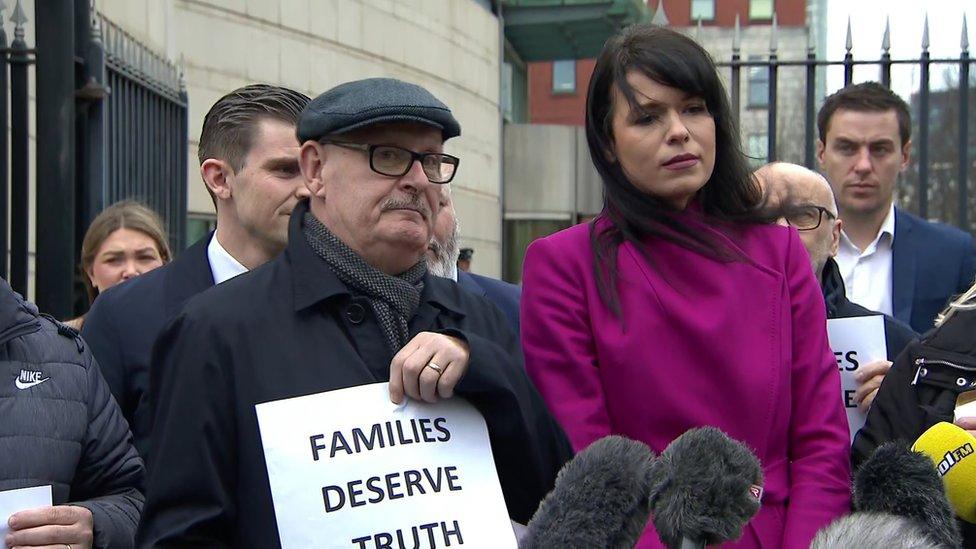Aidan McAnespie killing: Ex-soldier Holden avoids jail over Troubles shooting
- Published

Aidan McAnespie, 23, died after the shooting in Aughnacloy on 21 February 1988
An ex-soldier has been given a suspended sentence for killing an unarmed man at an Army checkpoint in Northern Ireland 35 years ago.
David Holden is the first soldier to be convicted of a Troubles-era killing in Northern Ireland since the 1998 Good Friday Agreement.
The victim of the 1988 shooting was 23-year-old Aidan McAnespie.
He was killed by a bullet that ricocheted off the road and hit him in the back at a County Tyrone checkpoint.
Holden, who was found guilty of manslaughter last November, was sentenced to three years in prison but the judge suspended the term for three years.
The McAnespie family described the suspended sentence as disappointing but added: "The most important point is that David Holden was found guilty of the unlawful killing of our brother Aidan."
Speaking outside court, his brother Sean McAnespie said: "We weren't looking for a pound of flesh, we were looking for just truth and justice."
In delivering a suspended sentence, the judge said Holden had given "a dishonest explanation to the police and then to the court" during his prosecution for manslaughter.
However, in mitigation, he referred to Holden's young age at the time of the shooting, his inexperience, clean record and that he was now a carer for is wife, in addition to experiencing his own health problems.
What happened to Aidan McAnespie?
Mr McAnespie was walking through a checkpoint in the village of Aughnacloy on his way to attend a Gaelic football match when the fatal shot was fired.
Holden, who is now in his early 50s, was 18 at the time of the shooting on 21 February 1988.
He was a member of the Grenadier Guards and was carrying out his first day of checkpoint duties.
The trial was told that Mr McAnespie was known to security forces as a "person of interest" as he was suspected of being a member of the IRA.
He was not armed or posing any threat when he was shot by Holden.
During the trial, the defendant claimed the shooting was an accident and that he did not intend to fire his weapon.

David Holden was a teenage soldier at the time of the checkpoint shooting
The trial heard that Holden did not realise the machine gun was cocked.
The defendant also claimed his hands were wet at the time and his finger slipped on the trigger of the gun, discharging three shots, one of which struck Mr McAnespie.
However, the judge did not accept Holden's account of what happened.
'Deliberately pulled the trigger'
Last November, he said he considered the defendant criminally culpable of gross negligence manslaughter, beyond any reasonable doubt.
Speaking when Holden was convicted, the judge said he had given "a deliberately false account" of the incident, which he found "entirely unconvincing".
He also said the defendant should have appreciated the "deadly consequences" that could follow from pulling the trigger of his machine gun.
During Thursday's sentencing hearing, the judge pointed out that Holden had been convicted of manslaughter and not murder "based on the fact that he did not intend to kill or cause serious harm".
"However, he was grossly negligent because wrongly assuming the gun was not cocked, he aimed at Mr McAnespie and deliberately pulled the trigger.
"The fact that the gun was cocked and ready to fire was the fault of others who were in the upper part of the sangar [security tower] before him," the judge added.
"The defendant could not know just from looking at the gun whether it was cocked, but that very fact should have told him not to pull the trigger.''

The shooting took place on the Monaghan Road in Aughnacloy at a checkpoint near the Irish border
The judge said it was clear from victim impact statements that Mr McAnespie's death had a "devastating effect" on the whole extended family.
He said he recognised that their pain, hurt and loss would continue, no matter what sentence was given to Holden, and that their suffering was made worse by Holden not being brought to trial at the time of the shooting.
"This is something the family shares with far too many families in our society who have not seen anyone held to account for all manner of killings, bombings and shootings," the judge said.
What did the judge say during sentencing?
In considering the sentence, the judge looked at other cases where soldiers had been prosecuted for non-intentional shootings but reflected that no two cases were the same.
He took into account Holden's age and inexperience at the time, and the trauma that he suffered as a result of the shooting.
Holden was confined to barracks for almost a year after Mr McAnespie's death and was discharged from the Army in 1990.
The court heard Holden had no criminal record before the shooting and had tried to make a positive contribution to society after leaving the Army.
The judge added that the former soldier was now a carer for his wife, in addition to experiencing his own health problems.
However, he also said the manner in which a case is defended can be an aggravating factor when sentencing is considered.
The judge pointed out that Holden gave "a dishonest explanation to the police and then to the court" during his prosecution for manslaughter.
He also said that the defendant "did not take the opportunity to express remorse" during the trial process.
However, he noted there were references to feelings of "guilt and shame" in Holden's pre-sentence reports, and some recognition of the loss experienced by the McAnespie family.
What did the family say?
The McAnespie family led a decades-long campaign to bring their case to court, and the victim's father recently died during the course of the proceedings.
In a victim impact statement, a relative of Mr McAnespie acknowledged that the killing is often referred to as one of the Troubles "legacy" cases.
But he added that, for the family, there was "nothing legacy about it" and their brother Aidan's death was a "current and continuing loss to all our family".

Aidan McAnespie's brother Sean said the suspended sentence was "disappointing" but the conviction was more important
Speaking outside court, his brother Sean McAnespie said the suspended sentence did not take away from the conviction.
"He dragged us through the courts for years," he said.
"We lost our father and sister in the duration of that. It was like being stopped at the checkpoint every time we came here."
'Accountability is still possible'
Holden could be both the first and the last member of the security forces to be sentenced for a crime committed during the Troubles.
The government is trying to pass legislation which would ban future Troubles-related prosecutions in a bid to draw a line under the past and promote reconciliation.
However, the Northern Ireland Troubles (Legacy and Reconciliation) Bill, external is opposed by victims' groups and all of the political parties in Northern Ireland.
Following Thursday's sentencing, Amnesty International UK praised the McAnespie family's "admirable courage and resilience" in pursuing the conviction.
"This case shows accountability before the law is still possible and must continue. It is vital the UK government shelves its Troubles Bill so other families can also get justice" said Amnesty's Grainne Teggart.
Sinn Féin MP Michelle Gildernew said the McAnespies' "campaigned with strength, dignity and determination" and added that her party "backs the family's call for the British government's cruel and callous Legacy Bill to be scrapped".
"Justice should have no time limit," said the Alliance Party's legacy spokesperson Sorcha Eastwood, adding the ruling demonstrates "the fallacy of the UK government's legacy proposals" on Troubles-era prosecutions.
Colum Eastwood, leader of the Social Democratic and Labour Party (SDLP), said the family's campaign was inspirational and "shows the futility of the British government's attempt to close down routes to truth and justice".
"Nobody has the right to stand in the way of families seeking to hold those responsible for the deaths of their loved ones to account," he said.
Veterans Minister Johnny Mercer, who has previously been highly critical of decisions to prosecute former soldiers over Troubles legacy cases, said the Ministry of Defence would continue to provide legal and pastoral support to Holden.
"I've made my views on the pursuit of elderly veterans clear in the past, and these remain unchanged," he said.
"But only by working together can we deliver better outcomes for all those affected by the Troubles."
In a statement, Northern Ireland Veterans' Commissioner Danny Kinahan said: "It was not the intention of Mr Holden to cause the death of Aidan McAnespie on that tragic day in February 1988.
"We must remember that the security services stood as the protectors of all the people of Northern Ireland during the dark days of our Troubles."
Mr Kinahan added that the "same cannot be said for the terrorists who actively went out to murder".
Related topics
- Published25 November 2022
